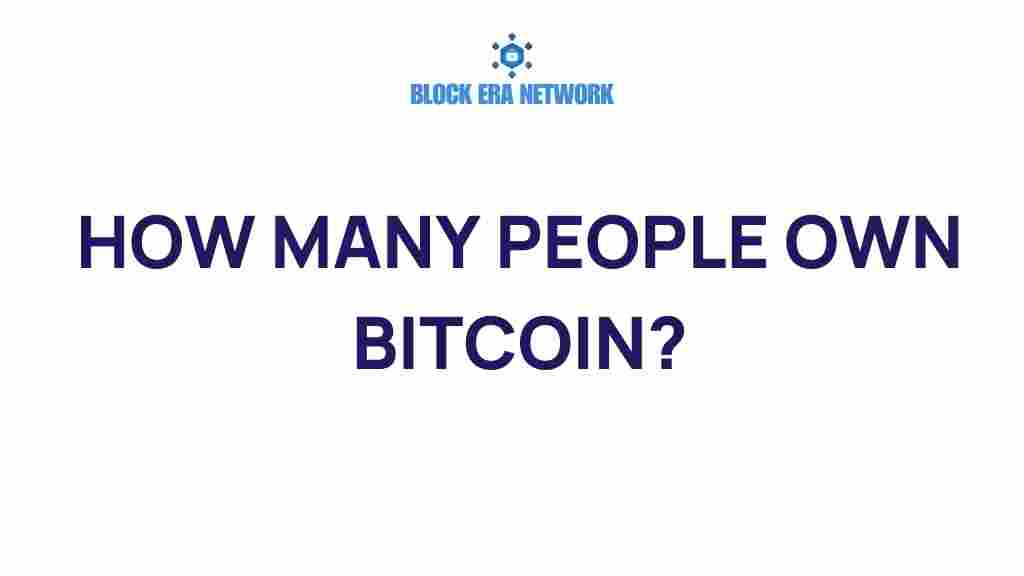Understanding Bitcoin Ownership
Bitcoin, the pioneer of cryptocurrencies, has revolutionized the way we think about money and transactions. But one question remains: *how many people truly own Bitcoin*? Bitcoin ownership has become a fascinating topic as the digital currency continues to gain traction globally. In this article, we will explore the intricacies of Bitcoin ownership, uncovering the data, patterns, and implications for the broader financial landscape.
How Bitcoin Ownership is Measured
Understanding the metrics behind Bitcoin ownership is no easy task. Since Bitcoin operates on a decentralized blockchain, there is no central registry of users or owners. Instead, researchers rely on several key indicators:
- **Number of unique Bitcoin wallets:** A common proxy for estimating ownership, although one individual may own multiple wallets.
- **Exchange user data:** Platforms like Binance and Coinbase report user statistics that offer insights into ownership trends.
- **Blockchain activity:** Transactions, wallet creation rates, and dormant wallets provide indirect clues about ownership.
By combining these data points, analysts attempt to paint a picture of Bitcoin’s ownership landscape.
Who Owns Bitcoin? A Demographic Breakdown
Geographical Distribution
Bitcoin ownership is a global phenomenon, with significant adoption in regions like:
- **North America:** The United States leads with high levels of adoption and investment.
- **Europe:** Germany, the UK, and Switzerland are prominent players in the Bitcoin market.
- **Asia:** Countries like India, Japan, and South Korea have seen rapid growth in cryptocurrency use.
Emerging economies such as Nigeria and Argentina are also adopting Bitcoin, driven by its potential to hedge against inflation and economic instability.
Age Groups and Professions
The demographic profile of Bitcoin owners typically skews toward:
- Young adults aged 18–35, particularly tech-savvy individuals.
- Professionals in technology, finance, and entrepreneurial sectors.
However, older investors and institutions are also increasingly joining the Bitcoin ecosystem, seeking portfolio diversification.
How Many People Own Bitcoin Today?
Estimating the exact number of Bitcoin owners is challenging. However, studies and reports suggest that:
- Over **420 million cryptocurrency users globally**, with Bitcoin leading the charge.
- Approximately **46 million Americans**, or around 22% of adults, own Bitcoin.
- Global wallet addresses exceed **200 million**, though many belong to the same individuals or institutions.
These figures highlight the rapid adoption and mainstream acceptance of Bitcoin in recent years. For more insights into cryptocurrency statistics, visit our dedicated page.
Factors Influencing Bitcoin Ownership Trends
Several factors contribute to the rise or fall in Bitcoin ownership, including:
Market Performance
Bitcoin’s price volatility plays a critical role in driving user interest. Bull markets often attract new owners, while bear markets lead to reduced activity.
Regulatory Developments
Countries with favorable cryptocurrency regulations, such as El Salvador, see higher ownership rates. Conversely, restrictive policies in nations like China can deter users.
Technological Advancements
Innovations such as the Lightning Network and decentralized finance (DeFi) applications make Bitcoin more accessible, fostering greater adoption.
Challenges in Determining Bitcoin Ownership
While data provides some insights, accurately measuring Bitcoin ownership remains complex due to:
- **Privacy:** Bitcoin’s pseudonymous nature makes it difficult to link wallets to individuals.
- **Wallet Mismanagement:** Lost private keys result in dormant or inaccessible Bitcoin.
- **Multiple Wallets:** A single user may control multiple wallets, inflating ownership estimates.
Addressing these challenges requires ongoing research and innovative methodologies.
Conclusion: What the Numbers Tell Us About Bitcoin Ownership
Bitcoin ownership is a dynamic and evolving phenomenon, shaped by economic, social, and technological factors. While exact figures remain elusive, the growing number of users and wallets indicates increasing global interest in Bitcoin.
As adoption continues to expand, understanding Bitcoin ownership patterns will be crucial for individuals, businesses, and policymakers alike. To stay informed about Bitcoin trends and ownership, explore our latest articles and resources on cryptocurrency and blockchain technology.
For further reading on how Bitcoin operates and its potential impact on the financial world, visit CoinDesk.
This article is in the category and created by Block Era Network Team

1 thought on “Unveiling the Numbers: How Many People Truly Own Bitcoin?”